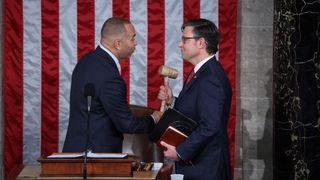Last year, Nancy Pelosi, then the Democratic Speaker of the US House of Representatives, was the most significant foreign policy decision-maker in the US Government. Her visit to Taiwan in August 2022 sent a message to Beijing – and the White House – that the US Congress would stand with the democratic island nation in the face of the mainland’s belligerence and intimidation.
That same year, Pelosi plussed-up Biden requests for aid to Ukraine, delivering billions of dollars more in weapons and aid than the president asked for. Pelosi’s hard line stiffened Biden’s spine after his disastrous withdrawal from Afghanistan in 2021 and altered the direction of American foreign policy.
After the ouster of Pelosi’s Republican successor, Kevin McCarthy, by his own party in early October, and then three weeks of chaos and failed candidates, the House has a new speaker. Rep. Mike Johnson is a young and relatively unknown congressman from Louisiana, who is generally considered to be a member of the Trumpist, America First wing of the Republican Party. If you haven’t heard of him, you’re not alone. Veteran Senator Susan Collins said she would have to Google him.
Johnson voted against certifying the 2020 election, opposed gay marriage and strongly supported former President Trump during impeachment proceedings. He has voted against aid to Ukraine but is a strong supporter of Israel. What does his speakership mean for the Indo-Pacific? Will he have as much impact on America’s global positioning as Nancy Pelosi?
It is important to understand the foreign policy dynamics within the Republican Party, which has always been divided between a pro-business, internationalist wing and a more populist, nationalist wing. During the Cold War and until the Trump administration, the internationalist wing was ascendant. Even during the administration of George W. Bush, who campaigned against peacekeeping missions and overcommitments abroad, the Republican Party quickly embraced internationalist principles in the wake of the 9/11 attacks.
During the Trump years, the nationalists began to assert themselves at the expense of internationalists. While in office, Trump pulled significant numbers of US troops out of Syria and North Africa, questioned US commitments to NATO and canceled military exercises with South Korea. Some of this nationalism resonated with American voters - particularly when Trump called out NATO allies for insufficient defence spending.
Now, during the Biden administration, congressional Republicans are reflecting this shift toward a more nationalist approach. This is particularly true in the House, where two-year terms tie representatives more closely to the momentary will of the people. Notably, aid to Ukraine is substantially unpopular among Republican House members.
In the upper chamber, where senators enjoy six-year terms, and therefore have more flexibility to vote against the popular will and for the national interest, aid to Ukraine is significantly more popular. The Senate’s Republican Leader, Mitch McConnell, like his old colleague and friend, President Biden, has called for a robust package that ties aid for Israel, Taiwan and Ukraine all together.
It is not an exaggeration to say that Senate Republicans and House Republicans represent two very different wings of the party. This tension over Ukraine between Republicans in the two chambers is likely to grow more acute until the American election in 2024.
The GOP’s nationalist and internationalist wings do come together on a different issue: competition with China, supporting strategic decoupling of the two economies and larger US military budgets and attention for the Indo-Pacific. Internationalists would like aid to Ukraine to accompany a tough China approach while nationalists believe the focus on Ukraine detracts from the ability of the United States to address the long-term and more existential threat from “near peer competitor” China.
This is best explained by former Trump defence official Elbridge Colby, who says: “As crises deepen in both the Middle East and Europe, it is more important than ever that we increase focus on the main threat: China in Asia. We are not ready so we need to focus as much as humanly possible on the biggest peril.”
What does all this mean for new Speaker Mike Johnson and his impact on the Indo-Pacific region?
The chairman of the House’s select China Committee, Rep. Mike Gallagher, says “My sense is that [Johnson] is in the ‘smart hawkish’ position on China.” Indeed, as head of the Republican Study Committee three years ago, Johnson authored a report that called for harsh sanctions against Chinese government-owned companies and liberalised US bilateral trade with friends and allies in the region as an antidote to Chinese economic bullying.
While at least at first he may not have as much impact as Nancy Pelosi, Speaker Mike Johnson appears poised to play a key role for US foreign policy, one that will lean heavily into the Indo-Pacific.






